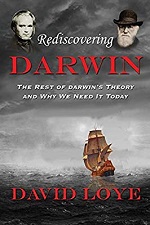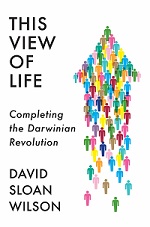|
TRANSLATE THIS ARTICLE
Integral World: Exploring Theories of Everything
An independent forum for a critical discussion of the integral philosophy of Ken Wilber
  Frank Visser, graduated as a psychologist of culture and religion, founded IntegralWorld in 1997. He worked as production manager for various publishing houses and as service manager for various internet companies and lives in Amsterdam. Books: Ken Wilber: Thought as Passion (SUNY, 2003), and The Corona Conspiracy: Combatting Disinformation about the Coronavirus (Kindle, 2020). Frank Visser, graduated as a psychologist of culture and religion, founded IntegralWorld in 1997. He worked as production manager for various publishing houses and as service manager for various internet companies and lives in Amsterdam. Books: Ken Wilber: Thought as Passion (SUNY, 2003), and The Corona Conspiracy: Combatting Disinformation about the Coronavirus (Kindle, 2020). "It is Part of this Miracle of Emergence"Ken Wilber Argues for his MysterianismFrank Visser
My advice: forget about involution, forget even about evolution as a drive, and study evolutionary science without any spiritual blinkers.
In the latest episode of the Ken Show, featured on Integral Life by Corey de Vos[1], "The Four Quadrants: A Guided Tour", the members-only Part III is devoted to the topic of "Perspectives, Involution and Evolution". Since we are offering a running commentary to each and every statement made by Wilber on evolution, we will respond briefly to this installment—though Wilber just repeats his worn-out "argument" for a mysterious force in the universe that produces everything under the sun, from atoms and molecules to human beings. Since this series is about the four quadrants, Wilber emphasizes that we cannot understand evolution without including the collective dimension. As he frequently phrases this: "there is never an individual without a collective" or "there is never a first individual." Now, it is not much of a revelation for biologists that evolution is a collective affair, the field of population genetics tells as much. It is populations that evolve, not individuals. A random high-school level online page on evolution explains it as follows: Darwin's theory was based on the mechanism of natural selection, which explains how populations can evolve in such a way that they become better suited to their environments over time.[2] As the following picture shows, it is individuals that get selected, while populations evolve: 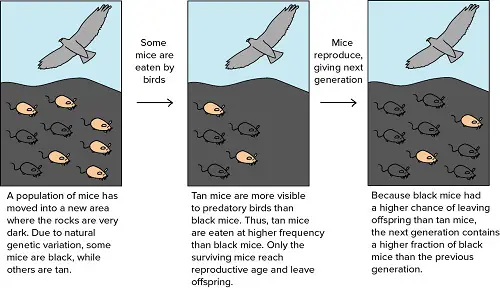
Natural selection acting on mice population over time (Khan Academy).
Wilber seems to have trouble understanding how species evolve, and how mutations can spread through populations. He repeats his standard and long-winded example of multiple benign mutations having to arise simultaneously in two members of a given species of the opposite sex, which have to live close to each other instead of "one being in Alaska and the other in Florida", for a new species to arise. And he maintains, that "even two mutations is already pushing the limits of impossibility". Instead, he offers his mysterianist view of evolution: "it is all part of the miracle of emergence."
That evolutionary biology explains the emergence of new species by the splitting up of populations into two parts, each going its own evolutionary way, seems not to occur to him. The problem of members of a future species living in different countries or continents (he usually uses the examples of Mexico and Siberia) doesn't arise this way. It all starts with naturally occurring variations within a given species. Darwin called variations "incipient species". It is by gradual divergence that the Tree of Life branches out into millions of species. Again, Wilber suggests that "evolutionists don't talk much about this very much, because it is part of this miracle of emergence, of evolution." No, they talk about this all the time. And it is no miracle to them at all. In fact, what does Wilber suggest here: that Eros/Spirit manufactures these multiple benign mutations in different members of a species? God as the Great Mutator? Is this a serious proposition at all? Or a mystification? He denies any connection with Intelligent Design or creationism, but in fact this makes things worse, by resorting to mystical metaphors and poetry. Then Wilber touches briefly on the esoteric doctrine of involution, the process that according to some spiritual traditions precedes evolution itself. The idea is that the Divine Spirit descends into deeper and deeper layers of matter, until it reaches the earthly plane and returns again upwards to its Source, presumably starting with the Big Bang. This is Wilber's cosmological view.[3] He mentions that he doesn't buy this doctrine wholesale, because where the traditions hold that during involution, everything we see emerging during evolution was first created as archetypal form, he assigns more creativity to the evolutionary process itself. At most some mathematical forms or natural constants were pre-given, before manifestation could start. So, is involution no longer providing the dynamics of evolution, that "pulls us all back home"? I think of involution, then, along the analogy of a rubber band: stretch it, and you have involution, which supplies a force (namely Eros) that will then pull the two ends of the rubber band (matter and spirit) back together again—in other words, an involutionary force that will pull evolution along. But the actual route taken in that return, and all its wonderful variety, is a co-creation of every holon and the currents of Eros in which it fluidly floats. (The Collected Works of Ken Wilber, Vol. II, p. 12). I have already argued, that there is every reason to grant full creativity to the evolutionary process, instead of hinting at, but never quite specifying, archetypal processes behind evolution. For if there clearly are no archetypes for iPhones, laptops and computers, what about elephants, fungi and orchids?[4] But for Wilber, this evolutionary creativity is a fundamental metaphysical principle, that can not be broken down in manageable chunks. He claims to have knowledge about this because of his meditative training over many decades, which has made him one with the Ground of Being, the Supreme Mind. Even if that knowledge claim is very far-fetched, and needs to be established separately, how would that state of mind provide any insights into how evolution works?
My advice: forget about involution, forget even about evolution as a drive, and study evolutionary science without any spiritual blinkers. All views of guided evolution are misguided, question-begging non-explanations.  But for Wilber, it is all quite simple. Many scientists have said similar things. Stuart Kauffman[5] for example, who believes in self-organization, or Ilya Prigogine[6], who discovered how even inanimate matter can jump to higher forms of organization when far from equilibrium. That these superficial similarities might hide deeper differences, Wilber doesn't care to elucidate. As I have argued, neither Kauffman nor Prigogine would agree with the spiritual spin he has put on their ideas or discoveries. It is incredible that Wilber doesn't seem curious about these challenges, and just repeats his standard arguments again and again. It even irritates him beyond words ("It is said I don't get evolution") that I keep insisting on a rational discussion about these science related matters. Self-organization for Wilber is just a stick to beat Neo-Darwinism, not a label for an interesting field of study that is relevant under certain very specific circumstances. It has be become his catch-all phrase to denote the mystery of major transformations in biology and beyond. He refers to Michael Murphy's The Future of the Body, in which he quotes geneticist and botanist G. Ledyard Stebbins who estimated there have been between 20-100 "major transformations" in evolutionary history (and about 640.000 "minor" ones).[7] Just a question: how many of these major transformations are guided by Eros/Spirit? All of them? Half of them? Which half? And how? How precisely? Why not mention one of these major transformations, just one, such as the fly's wing, and refer to current research—to see how far science has come? Ever heard of evo-devo, the new discipline that traces complex organs such as eyes and wings to mutations in regulatory genetic networks?[8] Wilber prefers to hide behind a smoke screen of grandiose metaphysical knowledge claims, repetitive arguments and angry tirades. But name-dropping and sloganeering is not the same as doing responsible science and philosophy. The "Ken-tells-it-all-from-his-loft"-format does help either. Wilber contends that my criticism boils down to quoting from Richard Dawkins, who is a "upper right quadrant reductionist!". He further mentions his recent contacts with David Loye[9] and David Sloan Wilson[10], who are interested in human cultural evolution, which fits nicely in the interior-collective quadrants. So? That natural and cultural evolution differ is widely acknowledged. Wasn't it precisely Dawkins who coined the term "memes", to differentiate cultural evolution from the gene-based natural evolution processes? Barely audible Wilber says something like "not very interesting", when referring to Dawkins, and his alleged reductionism. Well, read Dawkins' magnificent The Ancestor's Tale: A Pilgrimage to the Dawn of Life (2nd ed., 2016), to get an idea what evolution really means, how the uncountable life forms are interrelated and what we know for sure—and what we don't know yet. Such a different mental atmosphere! 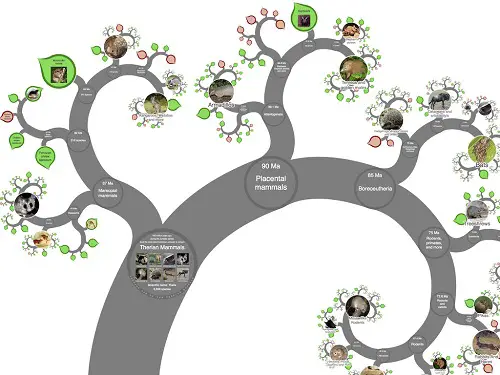
Walk through the Tree of Life with OneZoom (www.onezoom.org).
In fact, this is what Wilber's "theory" amounts to: "new things just arise, in all four quadrants, by transcend-and-include". Not much of a theory, that is. Mysterianism. At the end of the video De Vos mentions an article he found, which he assures Wilber "proves your point". It is about "energy is conserved through self-organization. It is a tactic to delay entropy. An anti-entropic movement of energy." I can't comment on the original article, because no reference is given, but this seems to be confused: complex adaptive organisms have found ways to delay their own decay, but not entropy. In fact they are more efficient in producing entropy! This is studied in the fascinating field of non-equilibrium thermodynamics (NET).[11] For a superb introduction to the topic of entropy, see Stanley Salthe's "Entropy: What Does It Really Mean?" on this website.[12] 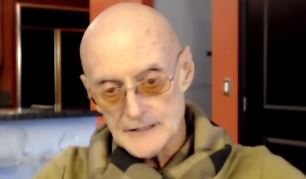 “This happens even in dead matter, Jesus Christ!” Obviously, Wilber has a strong aversion to discussing these matters at all. When mentioning Prigogine, and how order arises out of chaos when far from equilibrium, he even exclaims "this happens even in dead matter, Jesus Christ!" So? Even the mere suggestion that he might have misunderstood or misinterpreted these famous scientists makes him lose his enlightenment. Unable to use his reason, his strongly emotional reactions take over. De Vos anounces a future episode of the Ken Show which will be dedicated to "the mechanisms of evolution". That would be a very good idea. We will be looking foward to commenting on that one, for sure. Quite predictably, it will not be held in a critical spirit, but merely serve to broadcast Wilber's ideas to the wider public, as De Vos once explained the purpose of the Ken Show to me. This is truly a sad state of affairs. At least I am critically engaging Wilber's ideas. What more can a philosopher possibly want than critical engagement from his students? When will the dominant integral culture embrace the critical exchange of ideas, instead of the dogmatic dissemination of Wilberism? NOTES[1] Ken Wilber and Corey deVos, "The Four Quadrants: A Guided Tour", Part III, "Perspectives, Involution and Evolution", www.integrallife.com, January 28, 2020. [2] "Evolution and natural selection review", www.khanacademy.org. [3] Frank Visser, "Ken Wilber and Modern Vedic Evolutionism", www.integralworld.net, September 2019. [4] Frank Visser, "The involution/evolution cosmology, Ken Wilber holds on to an outdated scheme of existence", Review of "The Religion of Tomorrow", Part I, www.integralworld.net, May 2017. [5] Frank Visser, "Is Stuart Kauffman Really Wilber's Ally?", www.integralworld.net, October 2018. [6] Frank Visser, "Looking Closer at Ilya Prigogine, And at how Ken Wilber Co-Opts his Work for his Own Agenda", www.integralworld.net, Augustus 2019. [7] Also quoted in: Ken Wilber, Sex, Ecology, Spirituality: The Spirit of Evolution, Boulder, Shambhala, 1995, p. 44. [8] Sean B. Carroll, Endless Forms Most Beautiful: The New Science of Evo-Devo, New York, Norton, 2005. [9] David Loye (b. 1925) is a highly productive, self-published counter-cultural Darwin scholar, who has written a series of books on Darwin. Loye's latest book is: Rediscovering Darwin: The Rest of Darwin's Theory and Why We Need It Today (2018). His focus is on what he calls “Darwin's Lost Theory”, which is a thesis about human cultural progress through love and moral development, which supposedly was sketched in Darwin's The Descent of Man and forgotten and which contrasts with the more well-known “survival of the fittest” theory of Darwin's Origin of Species. Wilber, discussing Loye's work favorably in The Religion of Tomorrow (2017), argues that we “basically have Darwin on our side against the neo-Darwinians” (p. 709)—a highly questionable claim given the fact that Darwin was not known for having proposed a Spirit-driven view of evolution—far from it. In fact, this is exactly what Wilber claimed in Sex, Ecology, Spirituality (1995): that Darwin had obscured "for over a century" the spiritual view of evolution! So what is it? [10] David Sloan Wilson (b. 1949) is a so-called group selectionist, who has recently in This View of Life: Completing the Darwinian Revolution (2019) argued that we should “complete the Darwinian revolution” by applying Darwinian principles to human society. Instead of emphasizing the difference between natural and cultural evolution, Sloan Wilson seems to favor the natural dimension. Evolutionary biologist and philosopher Massimo Pigliucci, one of the founders of the Extended Synthesis, questioned this approach of applying Darwinian principles to human groups and societies in an online correspondence with Sloan Wilson, arguing they were “on different trains” ("On Human Cultural Evolution"). Sloan Wilson sees himself not as an armchair scientist but a practical activist who wants to improve society. This idealistic approach might easily conflict with a sober search for truth. Both are important but should not be confused. That he is a self-confessed disciple of Teilhard de Chardin (he sees his book as an updated version of The Phenomenon of Man) does explain why he feels affinity with Wilber. [11] Frank Visser, ""Equilibrium is Death", Energy, Entropy, Evolution and the Paradox of Life's Complexity", www.integralworld.net, February 2016. [12] Stanley N. Salthe, "Entropy: What does it really mean?", www.integralworld.net, February 2016.
|
